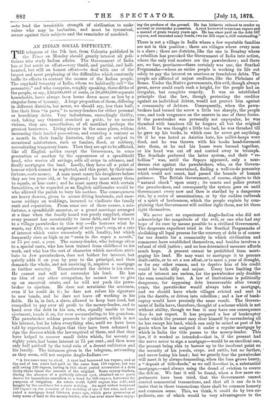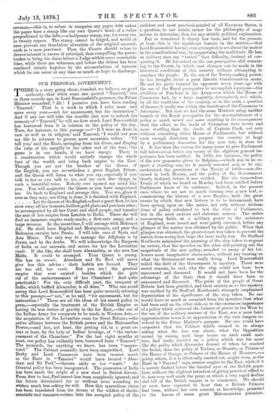AN INDIAN SOCIAL DIFFICULTY.
THE telegram of the 7th inst. from Calcutta published in the Times on Monday should greatly interest all poli- ticians who study Indian affairs. The Government of India has at last made an effort—very timid, and partial, and half- hearted, but still an honest effort—to deal with one of the largest and most perplexing of the difficulties which constantly baffle its efforts to content the masses of the Indian people. The copyhold tenantry of India, whom we habitually call" the peasantry," and who comprise, roughly speaking, three-fifths of the people, or say, 150,000,000 of souls, or 30,000,000 separate households, have always been borne down more or less by a singular form of tyranny. A large proportion of them, differing in different districts, but never, we should say, less than half, live their lives "in pawn" to money-lenders for either personal or hereditary debts. Very industrious, exceedingly thrifty, and, taking any Oriental standard as guide, by no means vicious, they are, nevertheless, of all mankind perhaps the greatest borrowers. Living always in the same place, seldom increasing their landed possessions, and counting a century as a month in their family histories, they all are subject to occasional misfortunes, such as famine, flood, or robbery, necessitating temporary loans. Then they are apt to be afflicted, like all English nobles except the Grosvenors, in some generation or another by the appearance of a spendthrift head, who wastes all savings, sells all crops in advance, and finally mortgages the land. Lastly, they have all a point of honour which cannot be neglected, and this point, by their mis- fortune, costs money. A man must marry his daughters before they are ten years old, or be disgraced ; he must marry them to equals, or lose caste ; and he must marry them with certain formalities, or be regarded as an English millionaire would be who allowed the parish to bury his mother. The consequences are heavy dowers, given to secure fitting husbands, and enor- mous outlays on weddings, incurred to vindicate the family rank and reputation. From some one of these causes, a mis- fortune, a spendthrift ancestor, or a grand marriage arranged at a time when the family hoard was poorly supplied, almost every peasant has occasionally to incur debt, and he incurs it to a village pawnbroker in this way :—He borrows what he wants, say £10, on an assignment of next year's crop, at a rate of interest which varies excessively with locality, but which frequently rises as high as an 66 anna in the rupee a month," or 75 per cent. a year. The money-lender, who belongs often to a special caste, who has been trained from childhood to his work, and who has the sort of character which novelists attri- bute to Jew pawnbrokers, does not bother for interest, but quietly adds it on year by year to the principal, and then demands the whole, and not receiving it, requires a mortgage as further security. Thenceforward the debtor is his slave. He cannot and will not surrender his land. He has no idea of any other occupation, he cannot bear to give up an ancestral estate, and he will not push the pawn- broker to ejection. He dare not scrutinise the accounts, even if he could do it ; he dare not refuse his signature to new bonds, and he dare not leave off working in his fields. He is, in fact, a slave, allowed to keep bare food, but compelled to pay over all profit to the money-lender, and to hand over the debt to his son, who, equally unable to bear ejectment, hands it on, for ever accumulating, to his grandson. The pawnbroker seldom proceeds to' ejectment, which is not his interest, but he takes everything else, until we have been told by experienced Judges that they have been ashamed to sign the decrees which the law required of them, and that they have helped to recover small debts which, for seventy or eighty years, had borne interest at 75 per cent., and then were only half paid-off by the total ruin of a decent cultivator and his family. The instances given in the telegram, astounding as they seem, will not surprise Anglo-Indians :— " A few cases may be cited. A ryot had borrowed ten rupees, and at the end of ten years had paid on the same loan 110 rupees, but was still owing 220 rupees, having in this short period accumulated a debt thirty-three times the amount of the original. Some money-lenders, during the absence of a perfectly solvent ryot, obtained an ex parte decree for immediate execution on a bond for 500 rupees, borrowed for purposes of irrigation. An estate worth 6,000 rupees was sold, and bought by the creditors for a mere nothing. An aged widow borrowed 150 rupees on the occasion of the wedding of one of her sons, and exe- cuted a mortgage bond thirteen years ago, which gave possession of forty acres of land to the money-lender, who has ever since been enjoy- ing the produoe of the ground. He has hitherto refused to render an account or, surrender possession. A.ryot borrowed seventeen rupees and a maund of grain twenty years, ago. He has since paid on the debt 567 rupees, and executed many bonds, two for 875 rupees, still outstanding."
There is not a village in India where a few reputable families are not in this position ; there are villages where every man is a slave ; there are districts, like the one in Bombay whew a rebellion has provoked the Government of India into action, where the only real masters are the pawnbrokers.; and there are, we fear, provinces—there certainly was one, the Sonthal Pergunnaha—where an entire people is working its life out solely to pay the interest on usurious or fraudulent debts. The people are afflicted of unjust creditors, like the Plebeians of Rome. Under the Native governments, this evil, though always great, never could reach such a height, for the people had an irregular, but complete remedy. It was an established principle that the law, though protecting the creditor against an individual debtor, would not protect him against a community of debtors. Consequently, when the pawn- brokers had turned the screw a little too sharply, the people rose, and took vengeance on the usurers in one of three forms. If the pawnbroker was personally not unpopular, he was thrashed with bamboos till he forgave all but the original debt. If he was thought a little too bad, he was thrashed till he gave up his books, in which case he never got anything. Or if he was hated as Asiatics hate, his millet-heaps were fired, and he was thrown with his books head-foremost into them, or he and his house were burned together, or his head was cut off and carried away in triumph. The Sonthals preferred the latter system, and their " re- bellion " was, until the Sepoys appeared, only a mur- derous riot against the pawnbrokers, who, as the Govern- ment subsequently ascertained, finding a well-to-do peasantry which could not count, had passed the bounds of human patience. The British Government, of course, objects to this " natural check " upon usury ; its courts and police protect the pawnbrokers, and consequently the system goes on until Government every now and then is startled by a dangerous riot, by a series of assassinations, or by the sudden outbreak of a spirit of lawlessness, which the people explain by com- plaining that Government will neither right them, nor let them right themselves.
We never met an experienced Anglo-Indian who did not acknowledge the magnitude of the evil, or one who had any hope of its cure by means possible to a civilised Government. The desperate expedient tried in the Sonthal Pergunnahs of abolishing all legal process for the recovery of debt is of course far too drastic for a community in which civilisation and commerce have established themselves, and besides involves a refusal of civil justice ; and no less determined measure affords much hope. A peasant cannot be prohibited from mort- gaging his land. He may want to mortgage it to procure draft cattle, or to set a son afloat, or to meet a year of drought, or for any other reason, and to deprive him of his credit would be both silly and unjust. Usury laws limiting the rate of interest are useless, for the pawnbroker only doubles the sum nominally lent. A law of limitations is politically dangerous, for supposing debt irrecoverable after twenty years, the pawnbroker would always take a mortgage, and we should have whole villages evicted and sent to join the dacoits, or driven into rebellion ; and a law of bank- ruptcy would have precisely the same result. The Govern- ment of India have, therefore, thought of a scheme which is not without ability, though we fear it may have one consequence they do not expect. It has prepared a law of bankruptcy under which the peasant may clear himself by surrendering all he has except his land, which can only be seized as part of his goods when he has assigned it under a regular mortgage by which in India the title passes to the money-lender. This law, if it worked as intended—that is, if the peasant had the nerve never to sign a mortgage—would be an excellent one, the peasant being able to borrow up to the insolvent point on the security of his jewels, crops, and cattle, but no farther, and never losing his land ; but we greatly fear the pawnbroker will meet it by always demanding, when the loan grows heavy, a " deposit of title-deeds," as we call it—that is, a substantial mortgage,—and always using the dread of eviction to coerce the debtor. We fear it will be found, when a few more ex- periments have been tried, that the Government cannot control commercial transactions, and that all it can do is to insist that in those transactions there shall be common honesty and common sense. This, we think, it could do by two ex- pedients, one of which would be very advantageous to the revenue,—this is, to refuse to recognise any paper debt unless the paper bore a stamp like our own Queen's head, of a value proportioned to the debt,—a halfpenny stamp, say, for every ten or twenty rupees. The stamp cannot be forged, and would at once prevent any fraudulent alteration of the original amount, such as is now practised. Then the Courts should refuse to decree interest in excess of principal, thus compelling the pawn- broker to bring his claim before a Judge within some reasonable time, while there are witnesses, and before the debtor has been rendered utterly hopeless by the accumulations of interest which he can never at any time so much as hope to discharge.



































 Previous page
Previous page